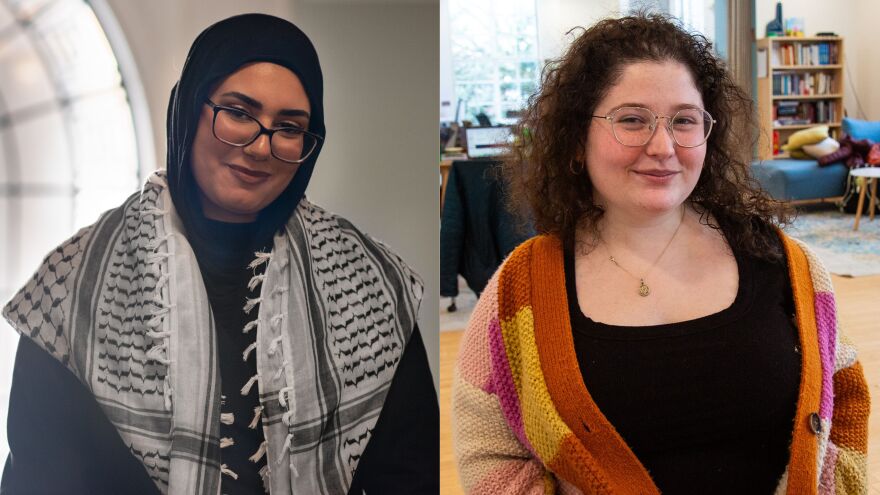For some, election days like Vermont's August 13th primary are exciting times for democratic participation. But there can also be an undercurrent of politician tension, especially if you have strongly held views that differ from those of your friends or neighbors.
The national organization Braver Angels works to educate people on how to have honest, open conversations that forge connections across party lines. Lincoln Earle-Centers of Montpelier, Vermont's Braver Angels state coordinator, Shanna Ratner of Fairfield, the blue co-chair of Braver Angels Franklin County, and Dan Pipes, the chapter's red co-chair, shared what they've learned through their work.
The executive editor of Vermont Public's newsroom, Brittany Patterson, then shared an update on the Citizens Agenda, the election reporting model Vermont Public adopted this year.

Here are five tips, culled from the conversation.
Set the table
If you want to have a fruitful conversation with someone whose views differ from yours, don't launch right into conversation — set the table first.
Here's the language Shanna Ratner suggests: "I would be really interested in understanding your point of view better. Here's my point of view, and I'm guessing that yours is different. Would it be OK if I asked you some questions?"
Using that language gives the person you're talking to a sense that you respect them. You're also giving them the space to say no to the conversation. "They're not forced into it," Ratner said. "And they might say, 'You know, not right now, but I'd love to do this another time. Let's try next Wednesday.'"
Acknowledge blind spots
Through Dan Pipes' time with Better Angels, he's come to understand that some language that feels reasonable to one person can feel hurtful to another. "People tend to shut down if they are attacking or feeling attacked," he noted, which can stop a conversation before it gains steam.
Instead of shutting down, Pipes said, try addressing the use of difficult language or another type of blind spot head-on, and from a place of genuine curiosity. He suggested this language: "Hey, I don't see that. Can you explain to me, from your experience, how that term has evolved and what it means to you? Because I'm just not seeing it."
Try the eavesdropper experiment
To create an atmosphere of mutual respect and trust, it can be helpful to learn how to talk about "the other side" in a non-polarizing way. Lincoln Earle-Centers suggests trying the eavesdropper experiment, which he learned at a Braver Angels workshop. Ask yourself, "How would a rational and well-intentioned member of the other group feel when listening to you describe their side? Respected or disrespected? Understood or grossly misrepresented?"
It can be a tough skill to learn. Earle-Centers has noticed that our culture often promotes disagreement and having strong, reactive feelings (just watch any reality show). "It's really important that we put the brakes on and recognize that we can show somebody respect and understand where they're coming from, and separately disagree — disagree strongly — or be disturbed."
Observe others as they cross political divides

What better way to learn than by example?
One of the most divisive issues in the news today is the war between Israel and Hamas. The conflict is deeply personal for many people, including in Vermont, but it's hard to talk about.
Recently, Vermont Public's Mitch Wertleib spoke to two women with Vermont ties and personal connections to the war — one Palestinian, one Jewish. They opened up with one another and shared how the conflict has impacted them personally. Listen here.
Participate in One Small Step
In collaboration with StoryCorps and other community organizations throughout Vermont, we invite you to meet someone new — a fellow resident with different political beliefs from you, who you might never talk to otherwise — for a meaningful 50-minute conversation. Vermont Public is one of just seven stations selected nationally to host One Small Step in 2024. With participant permission, these conversations will be preserved for future generations at the American Folklife Center at the Library of Congress.
Do you want to get your group or organization involved in the effort? Contact Karen Anderson for more details. Learn more here.
Broadcast live on Tuesday, August 13, 2024, at noon; rebroadcast at 7 p.m.
Have questions, comments, or tips? Send us a message or check us out on Instagram.







